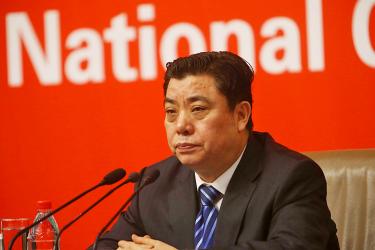China is using economic incentives to target 10 types of groups in Taiwan as part of its “united front” tactics, an unnamed government official said, citing national security intelligence.
The official said the groups targeted for engagement are local townships, young people and students, Chinese spouses of Taiwanese, Aborigines, pro-China political parties and groups, temples, descendants of Chinese who retain roots in China, labor groups, farmers’ and fishermens’ associations, and military veterans.
The government had previously estimated that China spends at least NT$10 billion (US$337.8 million) per year enticing Taiwanese to join united front efforts, but they believe that there might be more “invisible funding.”
China uses economic incentives when cultivating Chinese spouses, Aboriginal leaders, and local township and religious organizations, the official said, adding that Beijing might provide free visits to China or direct benefits to improve China’s approval rating.
China is also attempting to establish internal aid in Taiwan to direct public affairs and political activities, the official said.
Different levels of officials from China’s Taiwan Affairs Office (TAO), United Front Work Department (UFWD) of the Chinese Communist Party’s Central Committee and other groups have used Taiwan’s pro-unification groups and pro-China associations to arrange visits to Taiwan, gradually affecting exchanges using united front strategies, another unnamed source familiar with the matter said.
Trade groups, Chinese-funded firms and the local offices of Chinese businesses have members who also hold Chinese government positions, the source said, adding that these people cooperate with instructions from China.
During former president Ma Ying-jeou’s (馬英九) administration, Xiamen University’s Taiwan Research Institute and other Chinese think tanks researched Taiwan’s political and economic development and social sentiment for a long period in the name of academic cooperation and field research, the source said.
The organizations claimed that hotel costs were too high and rented homes in Taiwan for professors and students, the source said, adding that the groups used this opportunity to collect intelligence.
A suspected “price list” set by the TAO has emerged in a case involving New Party spokesman Wang Ping-chung (王炳忠), a national security official said.
Prosecutors have also found several million yuan in the accounts of other pro-China political parties and groups, the official said.
China has also hinted to political party members that if they gather military information in Taiwan, China would compensate them generously, while others have traveled to China to interact with national security officials and accept funds, the official added.
These cases are difficult to investigate, because it is not easy to prove that the money in those accounts was given by Chinese intelligence agencies or agencies involved with Taiwan, the official said.
Meanwhile, Chinese divisions involved with Taiwan are spread throughout several Chinese party, government and military divisions, including the UFWD, the Taiwan affairs system, think tanks and other divisions, the official said.
Taiwan has continuously tracked China’s attempts to influence Taiwanese politics and society, and has reacted appropriately, they added.
Source: Taipei Times - 2018/01/15





















